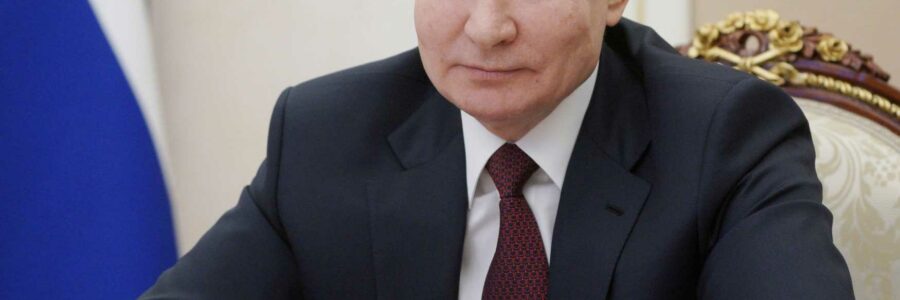
Putin points to America's own troubled history after Biden’s ‘killer’ remark
- Russian President Vladimir Putin said U.S. President Joe Biden's remarks about him reflect the past and current problems of the United States.
- Biden was asked in an interview this week whether he thought Putin was a killer and replied "I do."
- In response, Putin charged that Biden's remark reflected the U.S.'s own troubled history.
Russian President Vladimir Putin said Thursday that U.S. President Joe Biden's remarks about him reflect the past and current problems of the United States.
Biden was asked in an interview this week whether he thought Putin was a killer and replied "I do." Asked about Biden's comment during a video call marking the anniversary of Russia's annexation of Crimea, Putin charged that it reflected the United States' own troubled history.
The Russian leader pointed at the U.S. atomic bombing of Japan during World War II, as well as America's past history of slaughtering Native Americans and slavery, arguing that the painful legacies weigh on the United States.
"Otherwise, where would the Black Lives Matter movement come from," he said.
The exchange of tough statements comes on the heels of a declassified report from the U.S. national intelligence director's office that found Putin authorized influence operations to try to help Donald Trump win reelection in the November U.S. presidential election.
"(Putin) will pay a price," Biden said in the interview, asked about the declassified report.
Asked what he would tell Biden in response to his remarks, Putin said: "I would tell him: 'Be well.' I wish him health, and I say that without any irony or joking."
Recalling his childhood, Putin said that he and his friends would respond to insults with a rhyme saying "the names you call is what you are yourself."
"It's not just a rhymed childish joke, it has a deep psychological meaning: We see our own qualities in another man, we think he's like us and judge him accordingly," he added.
Putin claimed that the U.S. establishment likes to air accusations against other countries as part of its efforts to "solve domestic and foreign policy problems."
He noted that Russia would still cooperate with the United States where and when it supports Moscow's interests, adding that "a lot of honest and decent people in the U.S want to have peace and friendship with Russia."
"We are aware of it, we value it and will rely on them in the future," Putin said.
Putin spokesman Dmitry Peskov deplored what he called "very bad remarks by the U.S. president" that made it clear that "he doesn't want to normalize relations."
"We will proceed accordingly," Peskov said in a conference call with reporters, noting that "there was nothing like that in history." He wouldn't answer if Russia could go as far as to rupture diplomatic ties with the United States.
Russia announced Wednesday that it was recalling its ambassador in Washington for consultations.
Konstantin Kosachev, a deputy speaker of the Russian parliament's upper house, said Biden's "boorish statement" marks a watershed.
"Such assessments are inadmissible for a statesman of his rank," Kosachev said. "Such statements are unacceptable under any circumstances. They inevitably lead to a sharp exacerbation of our bilateral ties."
Kosachev warned that Russia's response wouldn't be limited to recalling the Russian ambassador "if the American side fails to offer explanation and excuse." He wouldn't elaborate on what other action the Kremlin may take.
Commenting on the Russian move Wednesday, White House spokeswoman Jen Psaki emphasized that "we will be direct, we will speak out on areas where we have concerns, and it will certainly be, as the president said last night — certainly, the Russians will be held accountable for the actions that they have taken."
Russia's relations with the United States and the European Union already have plunged to post-Cold War lows after Moscow's 2014 annexation of Ukraine's Crimean Peninsula, election meddling, hacking attacks and most recently, the jailing of Russia's opposition leader Alexei Navalny that followed his poisoning he blamed on the Kremlin. Russian authorities rejected the accusations.
Source: Read Full Article